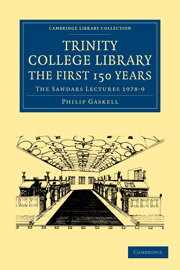Book contents
- Frontmatter
- Contents
- Lists of illustrations and plans
- Preface
- Terms and conventions
- Abbreviations
- 1546–1600
- 1 College libraries in the sixteenth century
- 2 The libraries of Michaelhouse and the King's Hall
- 3 The establishment of Trinity College Library
- 4 The need for books at Trinity in the sixteenth century
- 5 The College Library in the mid-sixteenth century
- 6 The College Library in 1600
- 7 The development of the collection up to 1600
- 8 Private libraries
- 1601–1695
- APPENDIXES
- Index
3 - The establishment of Trinity College Library
Published online by Cambridge University Press: 05 August 2011
- Frontmatter
- Contents
- Lists of illustrations and plans
- Preface
- Terms and conventions
- Abbreviations
- 1546–1600
- 1 College libraries in the sixteenth century
- 2 The libraries of Michaelhouse and the King's Hall
- 3 The establishment of Trinity College Library
- 4 The need for books at Trinity in the sixteenth century
- 5 The College Library in the mid-sixteenth century
- 6 The College Library in 1600
- 7 The development of the collection up to 1600
- 8 Private libraries
- 1601–1695
- APPENDIXES
- Index
Summary
Trinity College was founded in 1546, and in 1560 it received the Statutes by which it was to be governed until the nineteenth century. These first fourteen years of the College's history, which spanned the reigns of Edward VI and Mary I, were troubled ones for Cambridge, and the times could hardly have been worse for the establishment of the College Library. Not that it was really a new Library, for it is certain that Trinity took over the library apartments of Michaelhouse and the King's Hall along with the rest of their buildings, and no doubt it took over their books as well: Trinity continued to commemorate the donors of books to Michaelhouse and the King's Hall, and there were at least three Michaelhouse books in Trinity Library in the sixteenth century. What is quite uncertain is how many books were left in the libraries of Michaelhouse and the King's Hall when these colleges were incorporated in Trinity in 1546.
In the 1520s the King's Hall may have owned some 200 library books, and Michaelhouse perhaps rather more. The two libraries could then have totalled 400–500 volumes altogether and, since Michaelhouse was primarily a clerical college and the King's Hall was primarily a legal one, there may not have been a great deal of duplication. In 1535, however, the Royal Injunctions imposed on the University when Thomas Cromwell became its Chancellor and Visitor forbade the study of scholastic theology and of canon law, either in the University or in any college; and it is known that this resulted in the removal from many college libraries of large numbers of medieval text-books.
- Type
- Chapter
- Information
- Trinity College Library. The First 150 YearsThe Sandars Lectures 1978–9, pp. 19 - 21Publisher: Cambridge University PressPrint publication year: 2010First published in: 1980



